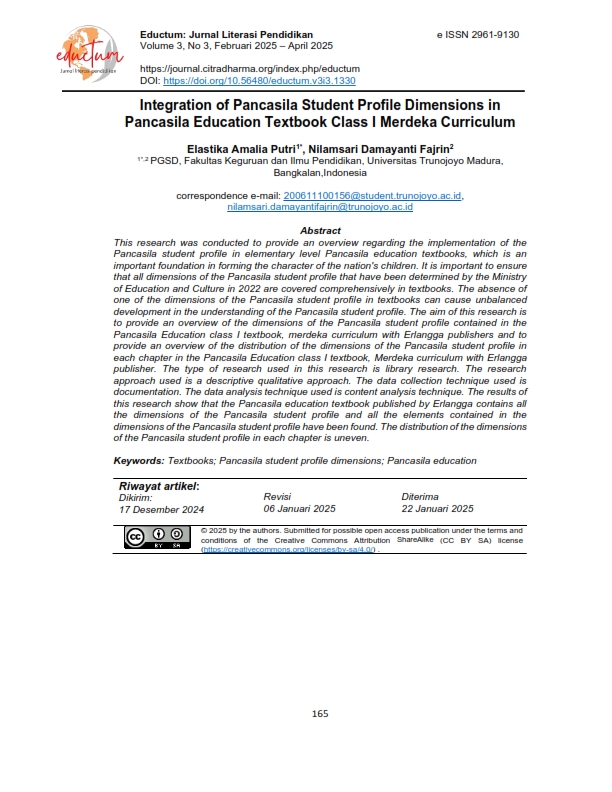Integration of Pancasila Student Profile Dimensions in Pancasila Education Textbook Class I Merdeka Curriculum
DOI:
https://doi.org/10.56480/eductum.v3i3.1330Keywords:
Textbooks, Pancasila student profile dimensions, Pancasila educationAbstract
This research was conducted to provide an overview regarding the implementation of the Pancasila student profile in elementary level Pancasila education textbooks, which is an important foundation in forming the character of the nation's children. It is important to ensure that all dimensions of the Pancasila student profile that have been determined by the Ministry of Education and Culture in 2022 are covered comprehensively in textbooks. The absence of one of the dimensions of the Pancasila student profile in textbooks can cause unbalanced development in the understanding of the Pancasila student profile. The aim of this research is to provide an overview of the dimensions of the Pancasila student profile contained in the Pancasila Education class I textbook, merdeka curriculum with Erlangga publishers and to provide an overview of the distribution of the dimensions of the Pancasila student profile in each chapter in the Pancasila Education class I textbook, Merdeka curriculum with Erlangga publisher. The type of research used in this research is library research. The research approach used is a descriptive qualitative approach. The data collection technique used is documentation. The data analysis technique used is content analysis technique. The results of this research show that the Pancasila education textbook published by Erlangga contains all the dimensions of the Pancasila student profile and all the elements contained in the dimensions of the Pancasila student profile have been found. The distribution of the dimensions of the Pancasila student profile in each chapter is uneven.
References
Alya, E. M. (2024). Pembelajaran Fisika Berbasis Proyek Terhadap Keterampilan Berpikir Kritis dan Kolaboratif Peserta Didik. Jurnal Citra Pendidikan (JCP), 4(4), 2117-2128. doi: https://doi.org/10.38048/jcp.v4i4.2665
Apriansyah, Z. D., & Wanto, D. (2022). Nilai-Nilai Pendidikan Budi Pekerti Menurut Ki Hadjar Dewantara dan Relevansinya dengan Kebijakan Pendidikan Karakater. LITERASI: Jurnal Pendidikan Guru Indonesia, 1(2), 105-113. doi: https://doi.org/10.58218/literasi.v1i2.382
Berliana, D., & Atikah, C. (2023). Teori Multiple Intelligences dan Implikasinya dalam Pembelajaran. Jurnal Citra Pendidikan (JCP), 3(3), 1108-1117. doi: https://doi.org/10.38048/jcp.v3i3.963
Fahmi, R. (2024). Pemikiran Ki Hajar Dewantara dan Relevansinya dalam Pendidikan Karakter Era Modern. Jurnal Review Pendidikan dan Pengajaran, 7(4), 15445-15452. doi: https://doi.org/10.31004/jrpp.v7i4.36715
Fitriani, F., & Maemonah. (2022). Perkembangan Teory Vygotsky dan Implikasi dalam Pembelajaran Matematika di MIS Rajadesa Ciamis. PRIMARY: Jurnal Pendidikan Guru Sekolah Dasar, 11(1), 35-41. http://dx.doi.org/10.33578/jpfkip.v11i1.8398
Hikmasari, D. N., Susanto, H., & Syam, A. R. (2021). Konsep Pendidikan Karakter Lickona dan Ki Hajar Dewantara. AL-ASASIYYA: Journal Basic of Education (AJBE), 6(1), 19-31. doi: https://doi.org/10.24269/ajbe.v6i1.4915
Jamaludin, S, S. N., Amus, S., & Hasdin. (2022). Penerapan Nilai Profil Pelajar Pancasila Melalui Kegiatan Kampus Mengajar di Sekolah Dasar. Jurnal Cakrawala Pendas, 8(3), 698-709. doi: https://doi.org/10.31949/jcp.v8i3.2553
Kamil, N. (2023). Analisis Penerapan Metode Montessori pada Aspek Kemandirian Anak Melalui Kegiatan Pembelajaran Practical Life. Jurnal Buah Hati, 1-15. doi: https://doi.org/10.46244/buahhati.v10i1.2098
Kusuma, E. S., Handayani, A., & Rahmawati, D. (2024). Pentingnya Pengembangan Kemampuan Berpikir Kritis pada Siswa Sekolah Dasar: Sebuah Tinjauan Literatur. Wawasan Pendidikan, 4(2), 369-379. doi: https://doi.org/10.26877/jwp.v4i2.17971
Laili, A. R., Setyawati, I. A., Kurniawati, N. S., & Dewi, N. R. (2023). Teori Perkembangan Kognitif Jean Piaget Tahap Operasional Konkret pada Anak Usia 6-11 Tahun Terhadap Hukum Kekekalan Luas. PRISMA, Prosiding Seminar Nasional Matematika, 6, 440-444. Retrieved from https://journal.unnes.ac.id/sju/prisma/article/view/66886/23865
Ravyansyah, & Abdillah, F. (2021). Tracing 'Profil Pelajar Pancasila' Within The Civic Education Textbook: Mapping Value For Adequacy. JURNAL MORAL KEMASYARAKATAN, 6(2), 96-105. doi: https://doi.org/10.21067/jmk.v6i2.5906
Sayfulloh, I. A., Desyandri, Irdamurni, & Latifah, N. (2023). Relevansi Teori Konstruktivisme Vygotsky dengan Kurikulum Merdeka: Studi Kepustakaan. Jurnal Tinta, 5(2), 73-82. Retrieved from https://www.researchgate.net/publication/374169602_RELEVANSI_TEORI_KONSTRUKTIVISTIK_VYGOTSKY_DENGAN_KURIKULUM_MERDEKA_STUDI_KEPUSTAKAAN
Tapung, M. (2024). Penguatan Tema "Kearifan Lokal" Berbasis pada Pemikiran "Ecological Literacy" David Orr Pada Projek Penguatan Profil Pelajar Pancasila. Syntax Literate: Jurnal Ilmiah Indonesia, 9(7), 3429-3443. doi: http://dx.doi.org/10.36418/syntax-literate.v9i7
Vavus, M. (2023). James Banks: Preeminent Scholar of Multicultural Civic Education. In M. Vavus, James Banks: Preeminent Scholar of Multicultural Civic Education. USA. doi: https://doi.org/10.1007/978-3-030-81037-5_123-1

Downloads
Published
Issue
Section
License
Copyright (c) 2025 Elastika Amalia Putri, Nilamsari Damayanti Fajrin

This work is licensed under a Creative Commons Attribution-ShareAlike 4.0 International License.
Authors who publish with this journal agree to the following terms:
- Authors retain copyright and grant the journal right of first publication with the work simultaneously licensed under a Creative Commons Attribution-ShareAlike 4.0 International License that allows others to share the work with an acknowledgment of the work's authorship and initial publication in this journal.
- Authors are able to enter into separate, additional contractual arrangements for the non-exclusive distribution of the journal's published version of the work (e.g., post it to an institutional repository or publish it in a book), with an acknowledgment of its initial publication in this journal.
- Authors are permitted and encouraged to post their work online (e.g., in institutional repositories or on their website) prior to and during the submission process, as it can lead to productive exchanges, as well as earlier and greater citation of published work (See The Effect of Open Access).

This work is licensed under a Creative Commons Attribution-ShareAlike 4.0 International License.
Deprecated: json_decode(): Passing null to parameter #1 ($json) of type string is deprecated in /home/citra-dharma-journal/public_html/plugins/generic/citations/CitationsPlugin.inc.php on line 49













